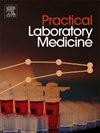评估越南非小细胞肺癌患者的突变-临床相关性和治疗结果
IF 1.7
Q3 MEDICAL LABORATORY TECHNOLOGY
引用次数: 0
摘要
本研究研究了越南非小细胞肺癌(NSCLC)患者的遗传和临床特征,重点研究了7个驱动基因的突变:EGFR、KRAS、NRAS、BRAF、ALK、ROS1和PIK3CA。目标是确定突变模式及其与临床因素的相关性,从而为个性化治疗策略提供信息。材料和方法对2019-2022年胡志明市大学医学中心299例非小细胞肺癌患者进行了横断面研究,记录了人口统计学、吸烟史和肿瘤分期。预处理样本通过大规模平行测序进行分析,生存分析评估EGFR/KRAS突变对生存和TKI反应的影响。结果大多数患者(88.6%)诊断为IV期,其中EGFR突变发生率为43.5%,以女性非吸烟者为主,而KRAS突变发生率为15.4%,以男性吸烟者为主。EGFR外显子19缺失(46.3%)和L858R缺失(39.0%)最为常见,KRAS G12C缺失(29.8%)为显性变异。接受TKIs治疗的egfr突变患者的生存期明显延长(p = 0.027);然而,在EGFR-和kras突变组之间没有观察到生存差异。共突变(3.7%)罕见,但可能表明耐药性。Logistic回归证实EGFR突变与女性非吸烟者相关,KRAS突变与男性吸烟者相关。结论越南非小细胞肺癌患者的基因分析显示,可操作的驱动突变非常普遍,支持将常规分子检测整合到非小细胞肺癌的管理中。egfr突变患者从TKI治疗中获益显著,强调了个性化治疗策略的重要性。需要进一步研究耐药机制和改进靶向治疗方法。本文章由计算机程序翻译,如有差异,请以英文原文为准。
Assessing mutation-clinical correlations and treatment outcomes in Vietnamese non-small cell lung cancer patients
Introduction
This study examines the genetic and clinical profiles of Vietnamese patients with non-small cell lung cancer (NSCLC), focusing on mutations in seven driver genes: EGFR, KRAS, NRAS, BRAF, ALK, ROS1, and PIK3CA. The goal is to identify mutation patterns and their correlations with clinical factors, thereby informing personalized treatment strategies.
Materials and methods
A cross-sectional study of 299 NSCLC patients at the University Medical Center, Ho Chi Minh City (2019–2022) recorded demographics, smoking history, and tumor stage. Pre-treatment samples were analyzed via massively parallel sequencing, and survival analysis assessed the impact of EGFR/KRAS mutations on survival and TKI response.
Results
Most patients (88.6 %) were diagnosed at stage IV. EGFR mutations were found in 43.5 % of cases, predominantly in female non-smokers, while KRAS mutations (15.4 %) were more common in male smokers. EGFR exon 19 deletions (46.3 %) and L858R (39.0 %) were the most frequent, with KRAS G12C (29.8 %) as the dominant variant. EGFR-mutant patients treated with TKIs had significantly longer survival (p = 0.027); however, no survival difference was observed between the EGFR- and KRAS-mutated groups. Co-mutations (3.7 %) were rare but may indicate resistance. Logistic regression confirmed EGFR mutations' association with female non-smokers and KRAS mutations with male smokers.
Conclusions
Genetic profiling in Vietnamese NSCLC patients reveals a high prevalence of actionable driver mutations, supporting the integration of routine molecular testing into NSCLC management. EGFR-mutated patients derive significant benefits from TKI therapy, underscoring the importance of personalized treatment strategies. Further research is needed to investigate resistance mechanisms and refine targeted therapeutic approaches.
求助全文
通过发布文献求助,成功后即可免费获取论文全文。
去求助
来源期刊

Practical Laboratory Medicine
Health Professions-Radiological and Ultrasound Technology
CiteScore
3.50
自引率
0.00%
发文量
40
审稿时长
7 weeks
期刊介绍:
Practical Laboratory Medicine is a high-quality, peer-reviewed, international open-access journal publishing original research, new methods and critical evaluations, case reports and short papers in the fields of clinical chemistry and laboratory medicine. The objective of the journal is to provide practical information of immediate relevance to workers in clinical laboratories. The primary scope of the journal covers clinical chemistry, hematology, molecular biology and genetics relevant to laboratory medicine, microbiology, immunology, therapeutic drug monitoring and toxicology, laboratory management and informatics. We welcome papers which describe critical evaluations of biomarkers and their role in the diagnosis and treatment of clinically significant disease, validation of commercial and in-house IVD methods, method comparisons, interference reports, the development of new reagents and reference materials, reference range studies and regulatory compliance reports. Manuscripts describing the development of new methods applicable to laboratory medicine (including point-of-care testing) are particularly encouraged, even if preliminary or small scale.
 求助内容:
求助内容: 应助结果提醒方式:
应助结果提醒方式:


